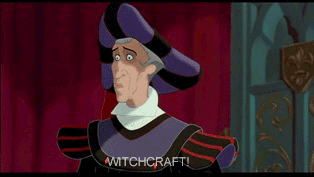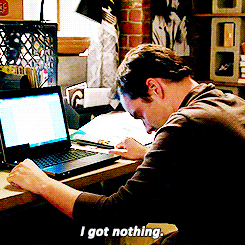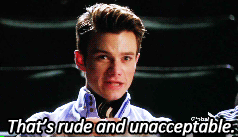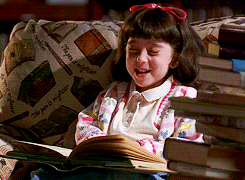Get ready, guys. This is a long one.
Last year there was a lot of talk about the inclusion of trigger warnings in books. There were people who agreed with them, people who didn't, and people who didn't really give a hoot either way. I meant to write this post last year, and just didn't. I guess I wanted a little more time to mull over what I thought before I wrote a discussion post like this.
Now the first thing I will say is that my views aren't meant to offend or insult anyone, though I hope they won't, and I'll also say that I'm very lucky in that I've never needed trigger warnings. There are certain things I don't like to read or watch, but thankfully I've never experienced any traumatic or upsetting event that has made me require trigger warnings. I just wanted to get that out there because there's a good chance that people who do need trigger warnings may have very different views on this topic to me.
Last year I completed an MA in Creative Writing. This was a year in which I got to dedicate my time to a creative project in the form of a 30,000 word portfolio as well as a 5,000 word reflective essay to accompany the creative work. Including me there were ten people on my course, and it was nice to have such a small number of us; everyone was working on something completely different, and we had two seminars a week in which we read extracts from each other's work and offered constructive criticism.
Very early on in the MA, we all agreed we would include trigger warnings at the beginning of our submissions, in fact it was requested by a couple of my fellow students. Sometimes trigger warnings are necessary; they were certainly necessary for one of the students on my course, who frankly wrote some pretty horrific stuff. Immediately there was a debate as to whether or not they were needed, and not surprisingly the one student whose work was most in need of trigger warnings was the one student who disagreed with them most vehemently. The rest of us were happy to include them - ultimately, it was no skin off our nose.
In truth practically none of us - aside from one student - wrote particularly graphic, violent scenes, but trigger warnings aren't only used for violence. Some students found it difficult to read about mental or sexual abuse, sometimes because, like me, they just didn't like reading about it, and sometimes because they had unfortunately experienced it themselves. Others, such as a good friend of mine, found it very difficult to read about any form of violence towards animals.
But where do we draw the line between a trigger and something that people just don't want to read?
There are some books which have trigger warnings already. The first one that springs to mind is Danielle Vega's The Merciless. I haven't actually read this book, but I do know there is a warning at the beginning because it includes graphic scenes of torture.
 |
| Pretty cover, though. |
Some people are squeamish, there's no shame in that, and a trigger warning like this is very useful, particularly when the cover of The Merciless is so simple and, in some ways, rather misleading as to its contents. The trigger warning's also great for people for whom torture is a trigger; some people find it very, very upsetting to read about other people being tortured, or to watch it for that matter - I know a few people who will never go near the SAW movies for that very reason.
I guess what I'm saying is trigger warnings are good for people who need them, but what about the people who don't? Trigger warnings for them are unnecessary, they may even be considered a spoiler. What if a book includes a trigger warning that manages to ruin an upcoming scene in the book? And how much of a book needs to be considered a trigger to warrant a trigger warning? Would one little scene justify putting a warning right at the front of a book? What if that put a reader off reading it when, in reality, the majority of the book is perfectly safe for them to read, and the triggering scene may be so minute they may not even find it triggering? Could the warning itself, then, actually make the trigger worse than it is by making the reader feel as though they're building up to something awful?
Who decides what counts as a trigger? People who have triggers themselves, or the people that don't?
Most importantly, as someone who doesn't require trigger warnings, is my opinion even valid? After all, I have no right, nor does anyone who doesn't have triggers, to criticise another person for theirs.
I don't mind trigger warnings in books for those who need them. Perhaps the ideal solution is to print two versions of each book, one with triggers and one without, but as someone who works in publishing I know how costly and tricky that would be for most publishing houses. I do think there are some real benefits to including trigger warnings, however, that even go beyond the simple reason of protecting readers with triggers. The main advantage I can see is that trigger warnings might help some readers who want to explore a certain topic more.
For example, if someone wanted to read more about characters who experience eating disorders or substance abuse or self-harm they'd be easier to find, and those readers would find it much easier to broaden their knowledge on a certain topic or even come to terms with their own struggles. Books, after all, are wonderful healers.
Having said that, I can't help but find trigger warnings a little concerning. I'm not one of those people who thinks someone with a trigger should 'just get over it', and I think people who do have that point of view need to go and give themselves a long, hard look in the mirror.
As someone with friends who have triggers I would never want to do anything that made them feel as though they were 'just being dramatic'; there's a reason I have friends who are triggered by violence towards animals and sexual abuse and terminal illness, and I never want to make them feel unsafe.
No, my worries are fairly simple. Where does it end?
As a feminist I'm constantly met with 'not all men' whenever I'm debating something or fighting for what I believe to be right, because for some reason some men find their gender being accused of misogyny more infuriating than the fact that all women, at some point, have been made to feel unsafe, belittled or downright pissed off by a man. My worries with trigger warnings would be whether or not there would be some sort of backlash.
Would racists and homophobes request trigger warnings to warn them that the book they're holding in their hands includes POC or LGBT+ characters? I'd like to think publishers would never agree to that - in fact I'm sure they wouldn't - but these people have a way of ruining a good thing for everyone else, and if they couldn't have trigger warnings then perhaps nobody could and we're back to square one.
My other, perhaps even bigger concern, is for the younger readers with strict parents. I was very, very lucky growing up in that my parents let me read whatever I wanted; whenever they asked me what I was reading it was because they were curious, not because they wanted to know if it was appropriate. My parents trusted me to read what I felt ready to read, and they trusted me to put a book down if I was finding it uncomfortable. When I was very young they always read to me, so if anything did frighten me, which I don't think it ever really did back then (it's hard to get frightened by Biff and Chip), they'd be there for me to talk to about it.
This was one of the best gifts my parents could have given me. Not only was their trust liberating - I could read anything I wanted, so I got to explore so many stories from a young age - but it meant that I got to discover for myself what I found uncomfortable, and think about why that was.
I've known people who, as children, were only allowed to read what their parents approved for them first. Time and time again I've heard stories of children who desperately wanted to read Harry Potter but weren't allowed to because their parents and grandparents believed it was anti-Christian. When parents do this to their children they don't let them decide what scares them or upsets them, and all that creates is blind hatred, ignorance and bigotry. When my parents let me read whatever I wanted it meant I got to explore race, gender and sexuality during my early teens, and it made me a much more socially aware person.
I'm not saying parents shouldn't be involved in their children's reading - for heaven's sake read with your children, they love that! - but creatively strict parents have a lot to answer for, and I can't think of anything worse than one of those parents with a trigger warning. Their children would never be able to read again.
Should our books really be censored? Literature is one of the ultimate artistic modes of freedom - you have to be a certain age to see a film, but your age doesn't matter when you crack open a book - and each year we even celebrate Banned Books Week. There's a big difference between banning a book and adding a trigger warning, of course, but would adding trigger warnings somehow lead on to banning certain books altogether?
Ultimately I've given myself about a year to think about this topic and I still don't have a straight answer, and I don't think I ever will. As with most things I can see the pros and cons of including trigger warnings in the books I read, though as someone who doesn't need them I'm still not entirely sure if my thoughts on the matter are even valid.
What do you think?


















